


|
State of the Union 2021
Hamzeh Roumani, Board of Directors PresidentJune 24, 2021 |
Note: Views expressed in this blog do not necessarily reflect the official position of MTCC 1113. They were written by Hamzeh Roumani, the President of the Board, and reflect his personal take on things.
The Balcony/Wall Project
This comprehensive project involves waterproofing, sealant replacement, stucco repairs, targeted painting, and the installation of new balcony eaves. An outline of the work is shown below:
The Board started planning for this project in late 2018 and the process of requesting quotations, appointing an engineering consultant, and selecting the winning bid was completed in September 2019. Work started in October 2019 with the creation of a mock-up to enable the Board to finalize colour selection. The project stopped for the winter (as waterproofing work cannot proceed in cold temperatures) and resumed in March of 2020 only to be put on hold within weeks per the Provincial COVID regulation (it is not considered an essential service). It resumed in June 2020 and stopped for winter in November 2020 with progress as shown below (green = "mostly completed", yellow = "in progress", and red = "not started"):

The project resumed in mid April of 2021 and is now in its final stages. All in all, exclusive of mock-up creation and winter/COVID stoppages, the project took about 9 months.
This ~$1.5M project is financed through our reserve fund so it has no effect on our operating fund. It has, however, been very intrusive and disruptive: noise was excessive at times; we were not able to enjoy our patios and balconies when work was in our block; and a number of other projects (such as sprinkler and landscaping) had to be put on hold pending the completion of this project. This is unavoidable given the nature and scope of the work but is necessary every 25 years or so to protect us from leaks; keep our structural elements in top shape; and enhance the aesthetics and the value of our community.
The Casita Initiatives
In addition to their regular duties (oversight, shared, renovations, disputes, etc.), Board members took a number of initiatives during the past year and are expected to continue these roles in the years to come.The initiatives are:
- Communication & Community (led by Amy)
This encompasses creating notices (from the Board) and managing their distribution; organizing events; and managing community volunteers. - Tutorial Videos (led by Hao)
This involves creating short tutorial videos to demonstrate basic things, such as where to throw big items or how to clean the dryer fan. The videos will also remind residents of the rules and address new issues. Three videos have already been produced and more are on the way. Check them out at: http://www.northtowncasitas.com/en/ourcommunity/video.php - Feedback & FAQ (led by Jason)
This includes monitoring the Residents' Website (Condo Control), in which residents can post and discuss topics, in order to discern recurring themes; find answers and solutions; and update the community's FAQ (Frequently Asked Questions), which is posted on the Board's Website. Check it out at: http://www.northtowncasitas.com/en/ourcommunity/maintainence.php - The Board's Website (led by Alan)
This involves creating, hosting, and maintaining the Board's Website, NorthtownCasitas.com. This is the official website of our condo and it contains things like this blog, the tutorial videos, the FAQ, notices, rules and regulations, etc. It complements the Residents' Website (Condo Control), which is a commercial, manager-dependent product that is hosted beyond our control. - Projects (led by me)
This involves monitoring ongoing projects; exploring new projects; and reviewing completed projects. Examples include managing colour selection for the Balcony Project; monitoring the frequency of repairs (stairs, roof shingles, window cranks); and exploring specs for A/Cs and doorbell cameras; LED retrofits; pipe snaking; gutter covers; organics sorting; and electric charging.
The USS View
The audited financial statements (ours and the Shared) were included in the notice of this year's AGM and will be discussed during it by the auditor and the treasurer. My take on these statements has a different perspective--I call it the USS View because it focuses on Utilities, Sitework, and Savings.The first step involves tracking expenses regardless of whether we paid for them directly or through the Shared. For example, we paid $412,885 for our reserve fund in 2021, but the Shared paid $619,308 for its reserve that year, and we pay 39.2% of that, so our true reserve contribution in 2021 is the sum of the two, or $655,654. This is a true measure of our Savings. Doing the same for Utilities (electricity, gas, and water) and Site-Work (repairs, maintenance, management, insurance, ... etc) leads to the following table:
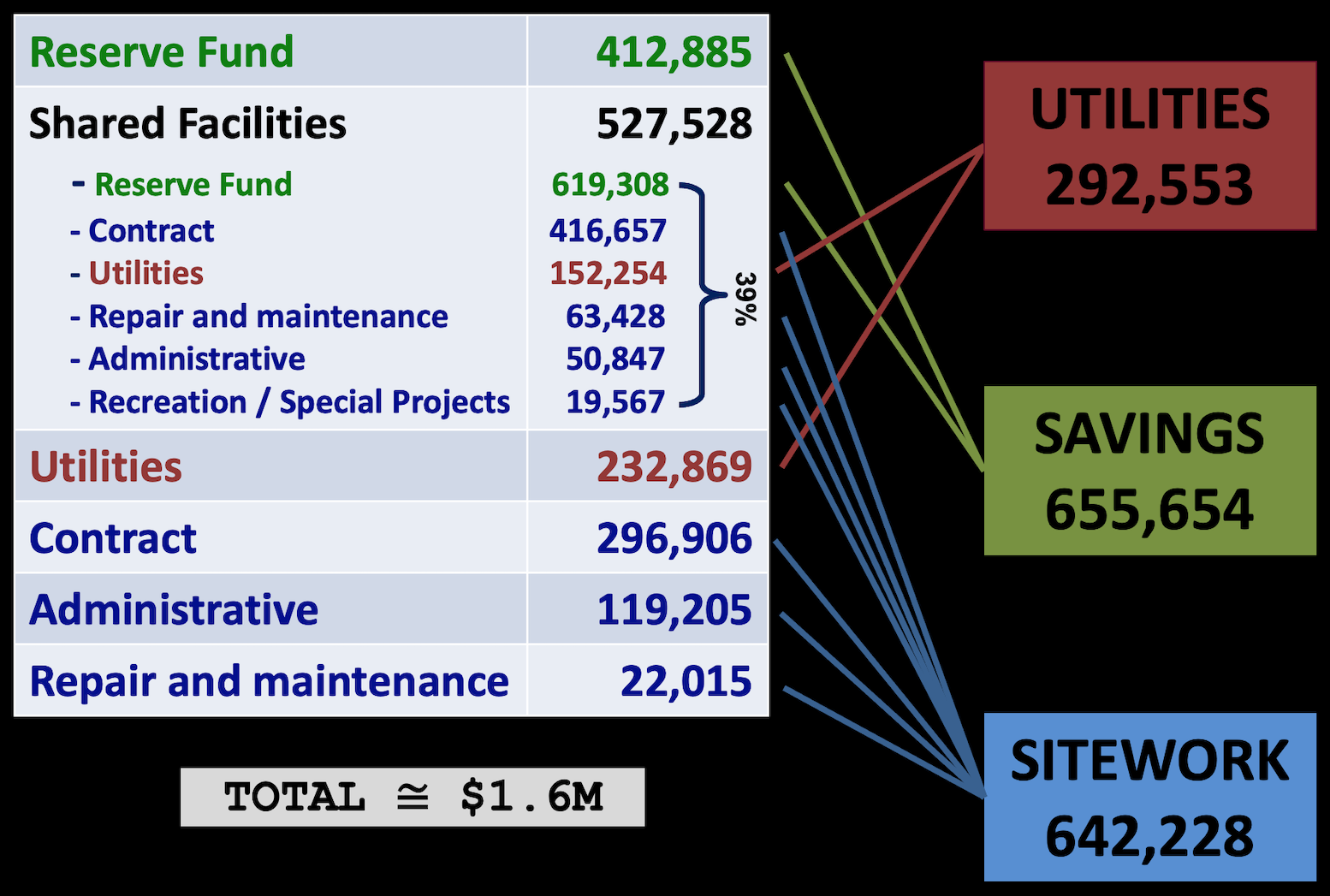
Amalgamating direct and shared expense types provides a true feel for how our fees are spent. Here is a fine-grained breakdown of our expenses:
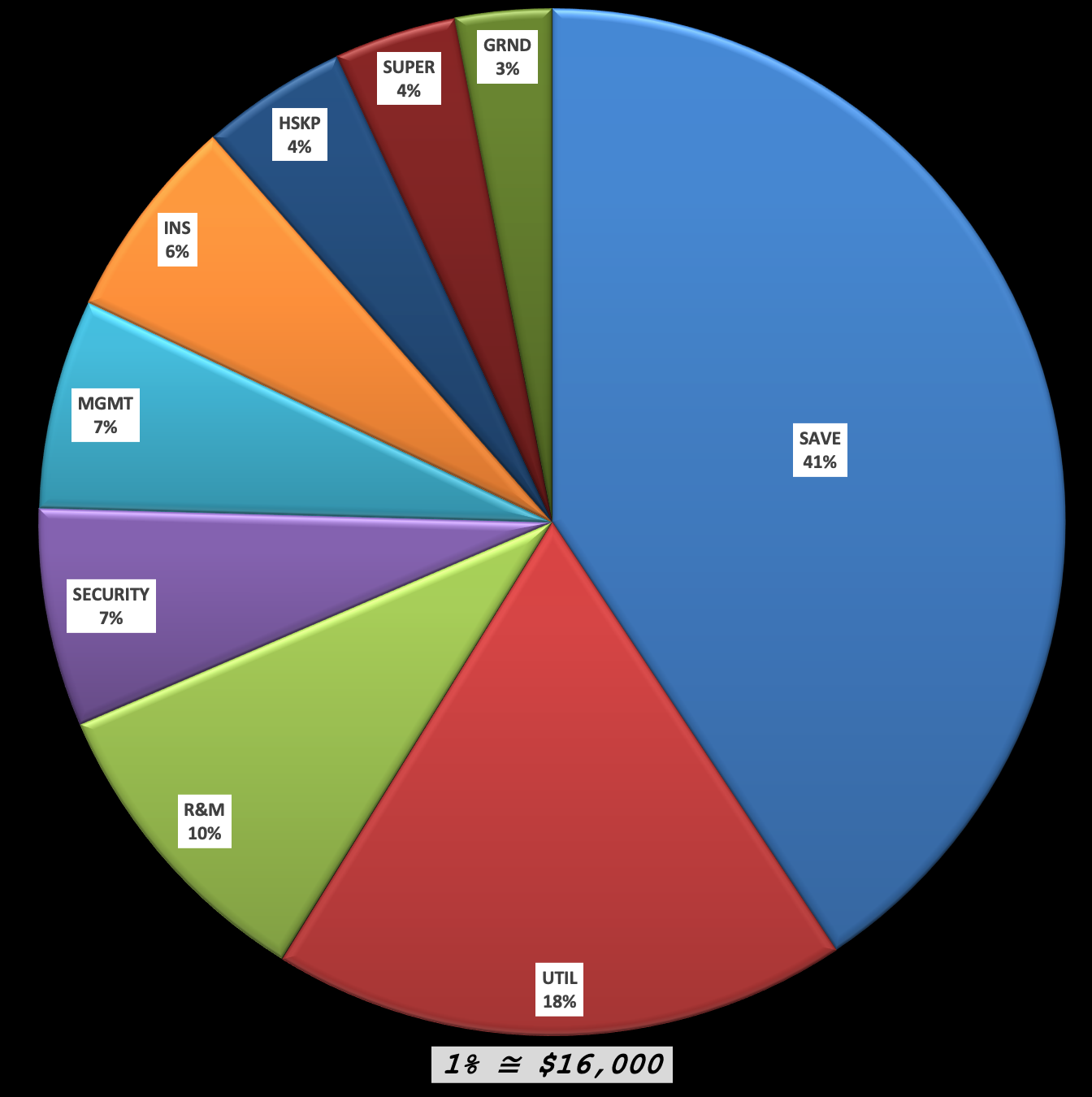
where R&M = repairs and maintenance, MGMT = property management, INS = insurance, HSKP = house keeping (cleaners), SUPER = superintendents, and GRND = ground (landscaping).
And by focusing on the three U,S,S categories, the following big picture emerges: For every dollar we pay in condo fees:
- 20 cents is spent on utilities,
- 40 cents is spent on site-work, and
- 40 cents is saved for a rainy day.
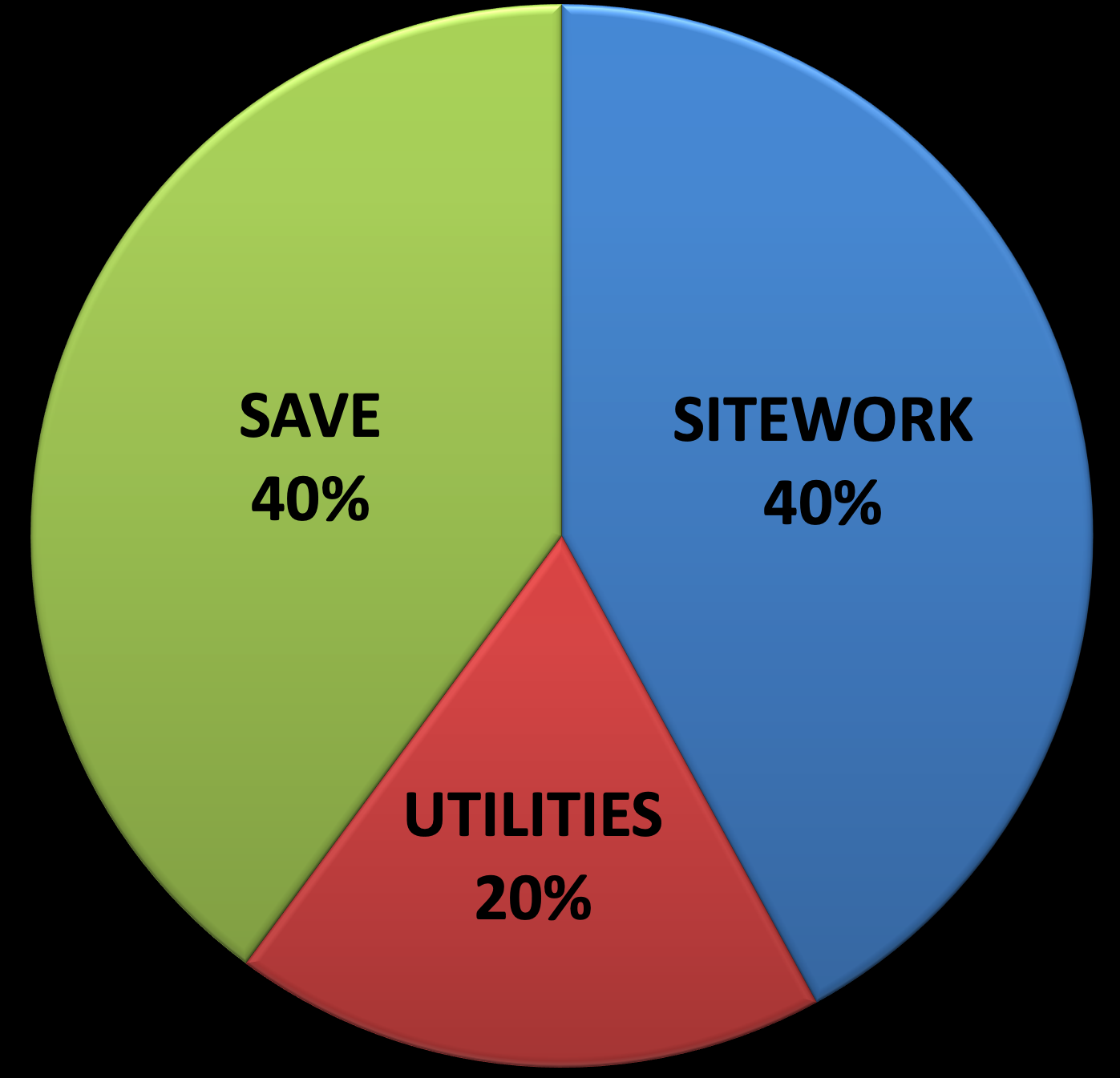
Condo Fees
Our condo fees went up by about 6% in 2020 and 5.4% in 2021. Why? And will this trend continue in the forceable future? I will try to answer these questions here.To answer the "why", let us look at what changed. We notice that while most expenses remained relatively stable, the following three have shot up significantly:
- Insurance (ours and the shared) went up by about 35%. This translates to an increase of about $20K. The increase is actually global (we had no claims) and is expected to continue to rise in the coming years. We were told this is due to increasing extreme weather events; increasing repair costs; and an increasingly-litigious environment, particularly in Ontario.
- Reserve fund contributions (ours and the shared) went up by 15%.This translates to an increase of about $65K. The increase is scheduled, per the study, and will continue at a high rate (~12%) for two more years before reverting to the nominal inflation rate.
- Water (ours) went up by about 10%. This translates to an increase of about $20K. The increase is partly due to increased consumption (a pandemic effect) and partly due to rates, which have been rising steadily for years and will likely continue to do so. BTW, the consumption increase in 2020 was significant (from about 4,000 cubic meter in Dec 2019 to over 4,400 in Dec 2020). And since lawn sprinklers would be off in December, the increase in consumption must have come from households--likely due to residents staying home more often and washing more often.
This explains the fee increase but how about the trend? Can we forecast the fees in the coming few years? I think we can by extrapolating historical data. Let us look at the history of our USS expenses during the past 10 years:
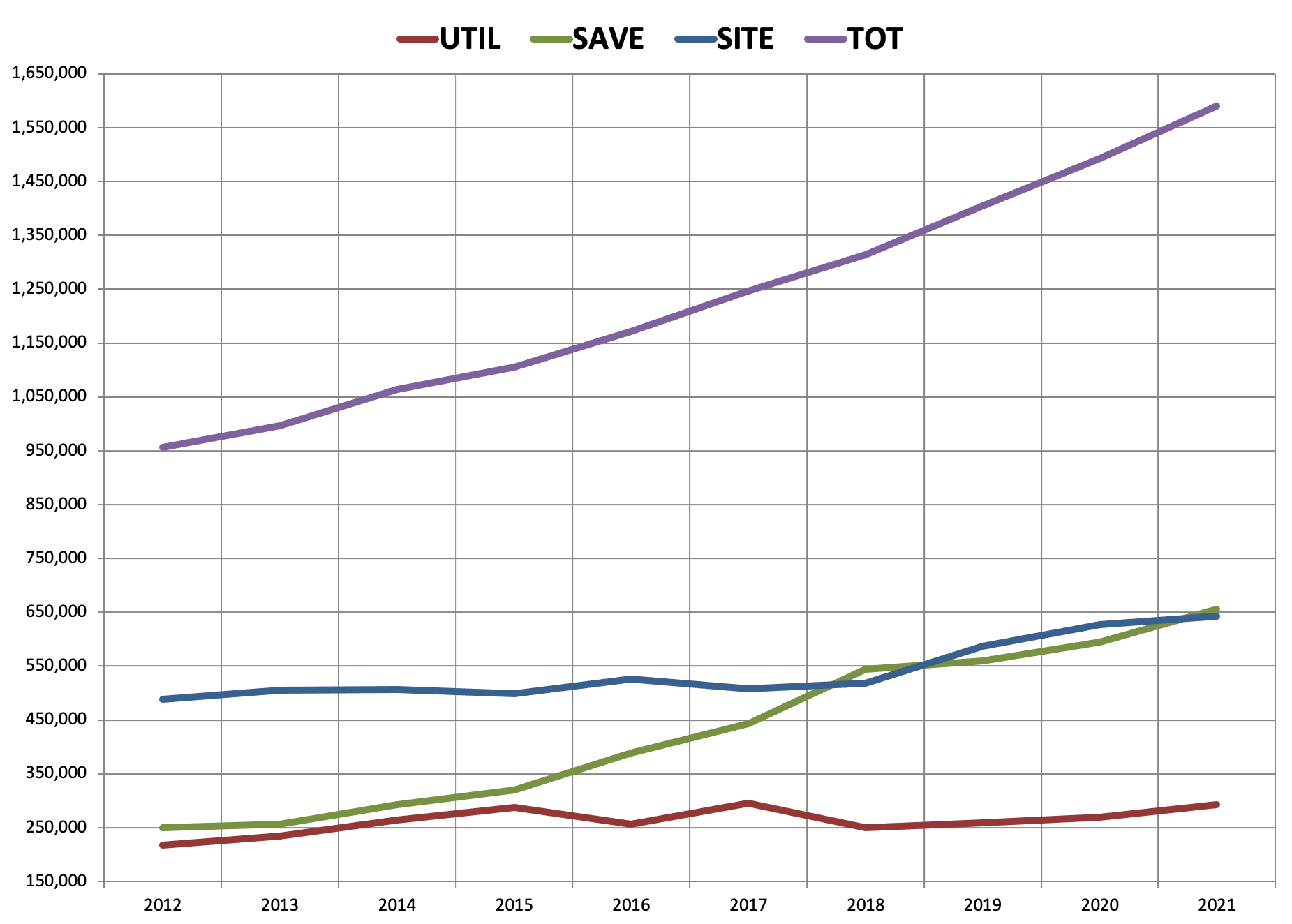
We see from the chart that:
- Utilities has been increasing at an average rate of 4% per year. This category is very difficult to predict given its dependence on global events and local politics (which affect the rates), and on weather patterns (which affect consumption). I will assume its increase will remain capped at 4%.
- Site-work has been increasing at an average rate of 3% per year. I believe this increase will continue to hover around 3% because our service contracts are pretty tight and they all have limits on increases.
- Saving has been increasing at an average rate of 10% per year. This increase will remain around 10% in the next 2 years (as per the reserve-fund study) and then drop. This could change of course if we encounter major failures before the replacement dates assumed in the study, but nevertheless, I believe 10% is a safe assumption.
- The expense total (purple) has been increasing at an average rate of ~6% per year.
4%x20 + 3%x40 + 10%x40 = 6%.
This is my prediction based on a 10-year history. The only "risky" assumption in my argument has to do with Utilities. I am assuming it will not go up by more than 4% but if the aging lead water pipes in Toronto started to fail, or if government started to add GST to the bill, things can change, so we should keep a close eye on it.To that end, let's take a deeper dive into our three utility bills and observe their trends over the past 10 years:
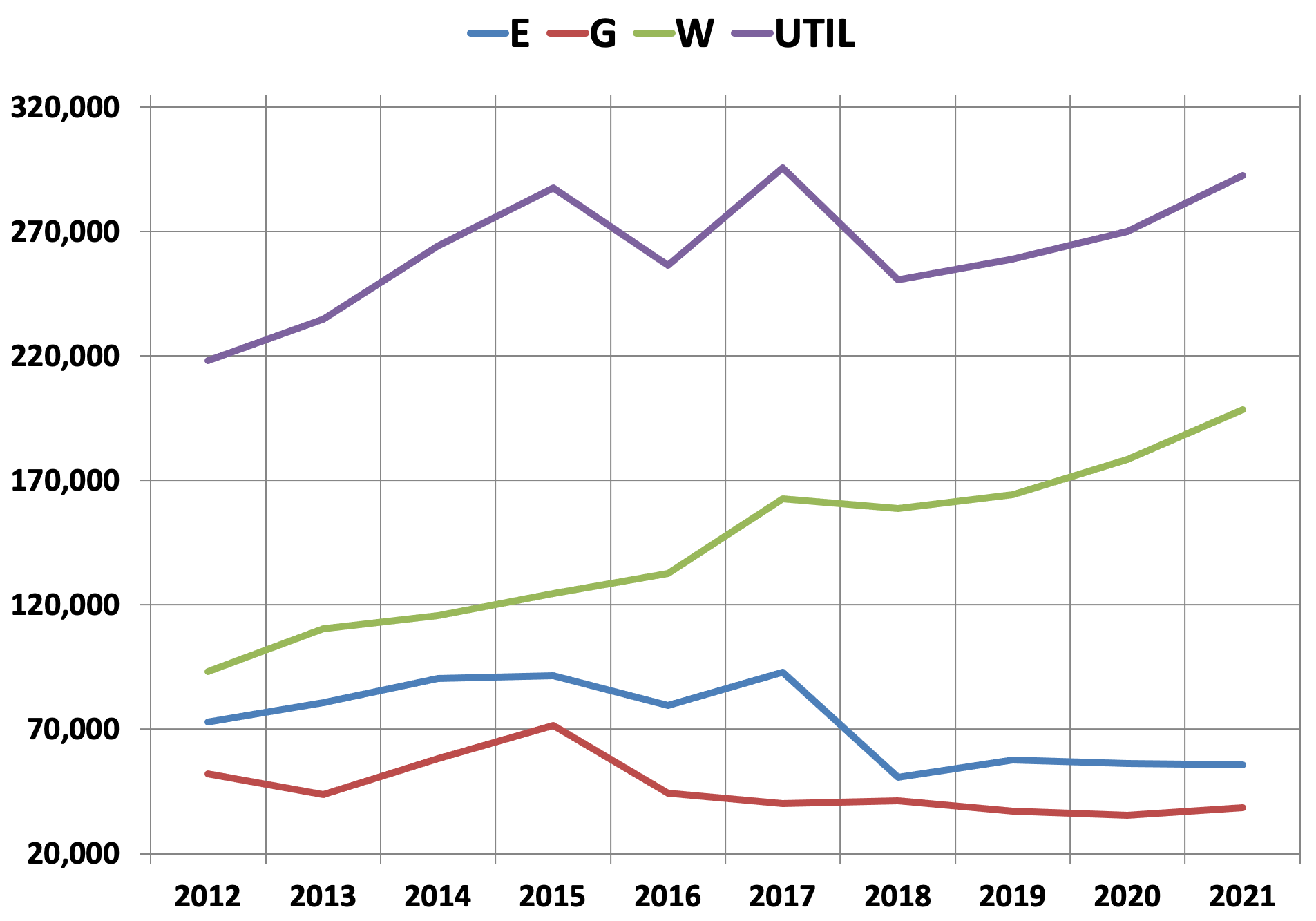
We see that electricity (blue) and gas (red) have been reasonably steady, but water has been increasing at an average annualized rate of about 10%. We cannot do anything about rates but we can work on reducing our consumption along these lines:
For water, invest in smart sprinkler systems (they adjust the watering schedule based on actual weather, soil condition, and evaporation rate). We should also encourage residents to use water-saving fixtures (toilets, shower heads, faucets, etc.) and control water waste. For hydro, we can use LED lights to retrofit corridor and courtyard lighting. And for gas, we should exercise better control over corridor temperatures and inter-block circulation.
Our HVAC Systems
HVAC (Heating, Ventilation, Air-conditioning) in our units is rather unconventional: heating through a water heater rather than a furnace; cooling is done through a central A/C without a ducted return; and ventilation through negative pressure relative to corridors. Three key components are involved:- Water Heater: this could be tanked or tank-less and is powered by natural gas. The hot water is used for domestic consumption as well as heating. Most of us have a rented hot water tank but you can opt to purchase it. The tankless option (which heats water on demand) saves space and is likely more efficient but it would have less throughput in my view because of the dual, domestic/heating usage.
- A/C Unit: this compressor is placed on balconies for multi-story units, and in an enclosure under the stairs for bungalow units. Some of us have original units (supplied by Tridel back in 1995) and some have Ecologix units (supplied through Reliance). Units facing Kenneth have their compressors on the lawn.
- Air-Handler Unit (AHU): this unit is connected to the Water Heater by water pipes, connected to the A/C Unit by refrigerant pipes; and connected to the room vents by ducts. Its job is to suck air in from inside our homes; cool it or heat it by exposing it to the pipes; and then force it through the ducts to the vents. The fan that does that can be operated with or without cooling/heating to enhance ventilation. Some of us have original AHU units (supplied by Tridel back in 1995) and some have Ecologix units (supplied through Reliance).
If you are interested in installing a unit different from the original Tridel unit or different from the Ecologix Reliance unit, make sure to check with the management office before you make any change. They have generic, vendor-neutral specs for the unit location and dimension, as well as for the demolition / installation methods.
On-Going
A quick list of tasks that have just been completed or are under study:- The Pandemic:
The pandemic has affected the work of our Condo Corporation in a number of ways, e.g. enhanced cleaning, controlled access to the management office, remote Board meetings and AGMs, curtailed door-to-door notices, postponement of Community events, and a significant increase in water consumption (discussed elsewhere in this blog). But in addition, we witnessed disappointing increases in a number of things:
- An increase in verbal abuse of staff and management
- An increase in theft of deliveries from front doors
- An increase in noise complaints
- An increase in illegal renovations
- An increase in rule violations
You can help reduce these problems:
Please call the gatehouse to report any violation you see, hear, or suspect. - Changes to Common/Shared Elements:
All elements outside your unit (whether exclusive-use or not) are either common (governed by our Condo Corporation) or shared (governed by the Shared). For example, balconies, patios, and block corridors are common whereas landscaping and the parking garage are shared.
Rules governing usage and changes to shared elements are set by the Shared Facilities Committee. For example, they have rules for what can be planted in patios and rules for adding charging capability to parking spots.
Rules governing usage and changes to common elements are set by our Board. We have recently set rules for A/C units placed on common elements and will soon release specs for Door Bell Cameras affixed to the frame of front doors. These specs aim to be vendor neutral by focusing on regulatory codes; safety; consistency, and site aesthetics. - 72 Church Avenue:
This is the lot at the south-east corner of our Community--the purple rectangle in the map below:
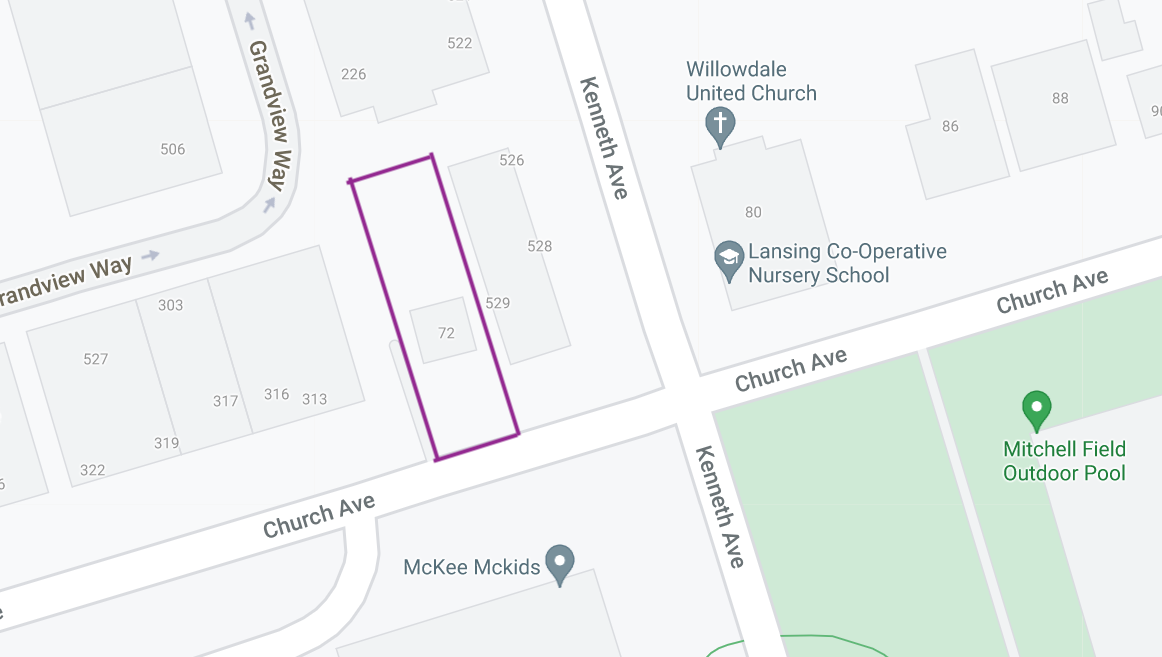
Tridel tried to purchase this land back in 1995 in order to make it part of our Northtown-1 Community, but the owner refused. It has a single family house built on it. Back in 2013, the owner applied to build a 4-story retirement residence on that lot with an underground parking. Our Community argued against the application citing serious concerns about safety, density, traffic, noise, zoning, etc., and the application ultimately fell through. Recently, the owner re-applied, this time for a 4-story rental building with an underground parking. The City organized a meeting on April 20, 2021 to discuss the proposal. You can view this meeting and/or read its script:
Link to the 72 Church Meeting
The Board feels that the same concerns that were raised back in 2013 still apply as-is to the revised proposal. Moreover, the new proposal violates the City's own zoning restrictions such as being 5 meters higher than the maximum allowed height, 30% higher density than allowed, and half the minimum setbacks from all four sides. The Board will fight this proposal by all means necessary and solicit the help of residents and neighbouring Condos. - Stairs:
We continue looking after the front stairs of multi-story units by fixing damaged concrete and applying waterproofing sealants. This perennial problem (as old as our complex) is now fully under control, complete with a maintenance schedule and a tight budget. - LED Retrofit:
In an effort to reduce our hydro consumption, we are looking into switching fluorescent lighting in our corridors to LED. The existing fixtures can be retrofitted so we don't need to buy new ones. - Gutter Covers:
Leaves, twigs, and dirt stuck in our eavestroughs clog drainage and cause icicles. We are looking into installing guards on these eaves to act as leaf filters.
This applies to roof, terrace-level, and balcony eaves.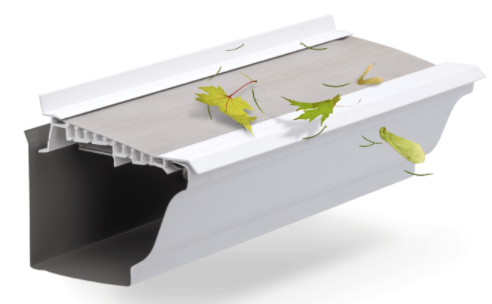

Views expressed in this blog do not necessarily reflect the official position of MTCC 1113. They were written by Hamzeh Roumani, the President of the Board, and reflect his personal take on things.





